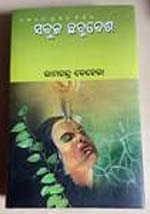I put it down to serendipity that I read the short story collection under review shortly after reading Ramachandra Behera’s novel Mukti ra Ruparekha (1990) both in the original and in its just published English translation entitled Contours of Liberation. An amazing novel about the tragic outcome of the conflict between desire for personal pleasure and parental obligation and filial love, the work betokened certain signature qualities of the acclaimed Odia writer, which the short story collection has happily confirmed.
Behera’s trademark qualities are, firstly, a focus on the peripheral and provincial in opposition to the central and metropolitan; secondly, a concern with people from the middle and lower middle class, which occasionally extends further downward into the Dalits and the Adivasis; thirdly, vivid portraiture and dramatic rendering going hand in hand; fourthly, and most importantly, language used as a precision instrument to analyse, define and articulate causal connections among seemingly disparate phenomena, be they of the social world or of the subjective consciousness.

